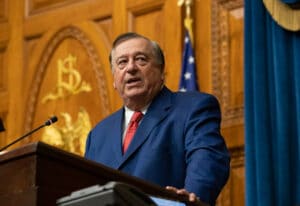
House Speaker Ronald Mariano addresses his colleagues on Dec. 30, 2020. Photo by Sam Doran | State House News Service
House Speaker Ronald Mariano outlined plans on Thursday for a $10 million job training program and long-term borrowing effort to fuel an offshore wind energy boom assisted by a Biden administration friendly to clean energy.
Mariano also pledged to address broadband affordability by fostering competition in that sector to address a digital divide illuminated by the pandemic, which has amplified the need for fast, reliable internet service.
The Quincy Democrat’s announcements, included in a speech to the Greater Boston Chamber of Commerce, come as Massachusetts slowly rebounds from the COVID-19 pandemic and confronts the stark reality that tens of thousands of jobs lost over the past year may not come back soon, or ever. That prospect points to the need to “act boldly” on job creation, Mariano said, telling employers the House is open to embracing innovative approaches to some old issues.
The focus areas laid out in the speech are important because Mariano, like his predecessor Robert DeLeo, has set the legislative priorities in the early weeks of his speakership with policy pronouncements followed by relatively quick and favorable votes by the full House.
Mariano also efforted early in his speech to describe Senate President Karen Spilka as his “close partner,” a potential indication of a level of harmony across the branches that at times seemed absent between DeLeo and Spilka. Since January, the two have dictated the agenda with a series of joint statements.
Mariano also declared that he’ll work this session “to authorize a large-scale bonding effort to establish the South Coast of Massachusetts as a regional hub of the offshore wind energy industry.” With the state and industry players angling to establish an array of deepwater turbines south of Nantucket and Martha’s Vineyard, Mariano likened his planned bonding effort to the state’s heavy investments to nurture the life sciences sector here.
“We must pursue the same strategy to make Massachusetts the leader of our clean energy future,” he said.
The state’s life sciences strategy launched in 2008 with the passage of a 10-year, $1 billion investment program, followed by the enactment of a law in 2018 that called for $623 million in additional investments and tax credits over five years.
Municipalities like New Bedford have also sought to align existing state incentive programs with their aspirations to play major roles in the wind industry.
The speaker did not put a price on his offshore wind capital investment plans. The state has invested in the New Bedford Marine Commerce Terminal to make it a staging area for the specialized needs of the industry, and Mariano said additional investments are needed because “our competitors are catching up.”
“If we want to maintain our edge in this fast-growing industry, we must continue to invest in our port infrastructure,” he said.
The House’s fiscal 2022 budget, which will be released next month, will commit $10 million to the Massachusetts Clean Energy Center to train workers for jobs in the offshore wind industry. Rep. Jeff Roy, who co-chaired the Higher Education Committee last session and is leading the Energy Committee this session, has been asked by Mariano to explore ways “to improve our wind energy workforce pipeline going forward,” the speaker said.
Mariano also said the pandemic has highlighted uneven broadband access in dense urban centers, not just rural access problems that have been a focus of attention.
“I am committed to increasing broadband affordability across the board,” he said. “And we can do that by encouraging competition, and subsidizing access for low-income residents.”






